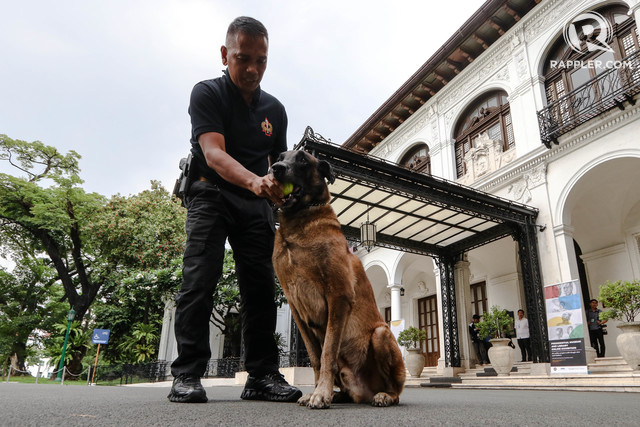The Presidential Security Group will get 18 new dogs under the 2018 budget

DINDO'S DUTY. Presidential Security Guard (PSG) Chief Sergeant Richard Parco plays with Dindo, a k9 Belgian Malinois dog, inside the Malacanang Grounds in Manila. File photo by Lito Boras/Rappler.com
New dogs will be joining the Presidential Security Group's (PSG) roster of canines, ensuring President Rodrigo Duterte and his VIP guests have better protection.
This follows a 2016 Commission on Audit (COA) report to speed up the procurement of new dogs for the PSG due to Duterte's active lifestyle – 25 dogs are required to perform a full bomb sweep and detection during Duterte's official functions, but at that time only 20 were in active rotation.
A 2017 audit of the General Headquarters - Armed Forces of the Philippines (GHQ-AFP), found that it had 23 Military Working Dogs listed as “effective” as of July 2017, with 18 new dogs meant for procurement under the 2018 budget.
Of the 18 dogs, 11 were requested in 2017 but were funded under the 2018 capital outlay. Seven other dogs will be acquired under this year's budget to replace those retiring and going "inactive."
Issues with the number of dogs in the roster were previously resolved by borrowing dogs from the Philippine Army K9 units as well as the Armed Forces of the Philippines (AFP).
The Army sent over “King” and “Jerry," both Belgian Malinois, while the AFP provided a German Shepherd named "Kara" and the Labrador "Brandon."
A dog's duty
Depending on the breed, dogs employed for police or military duty typically live between 10 to 14 years, with their effectiveness for duty extending to between 5 to 8 years after training.
The PSG’s veterinary officer decides when a dog should be taken off the active roster as a result of age or diminished capability.
The PSG-Special Reaction Unit said COA’s proposal to streamline the procurement of new dogs each year has been taken up with the Logistics Office “to ensure a reasonable inventory of effective military working dog complement.”
Under COA's proposal, funding allocations should be automatically included in the PSG’s annual budget as an anticipatory measure for getting new canines, as opposed to asking for funds when it becomes urgent.
The PSG has previously relied on donations over the past 12 years to provide for its need to augment its K-9 units. This is seen as unreliable, as training and schooling the dogs takes time, and further time is needed to bond with their handlers.
Retiring dogs on the "inactive" roster, meanwhile, will go through an adoption process. They will, in most circumstances, be taken care of by their former handlers.

No comments:
Post a Comment
Note: Only a member of this blog may post a comment.